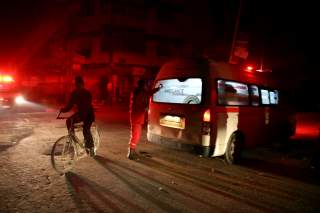Syria and Donald Trump's Impulses
Impending decisions about U.S. troops in Syria will be the next significant outcome of the continuing tussle, between a president’s urges and his appointees, that constitutes Donald Trump’s foreign policy. Given Trump’s limited attention span and the erratic way in which he allows others to influence his decisions, however, policy on Syria will not necessarily reflect a larger pattern extending to other issues.
A dominant theme in much current commentary about Trump’s presidency is that, after more than a year in office, he at last feels comfortable in reverting fully to the demagogic habits and themes that characterized him as a campaigner. According to this interpretation, he no longer feels constrained by subordinates—such as outgoing Secretary of State Rex Tillerson and outgoing national security adviser H.R. McMaster—who have annoyed Trump with advice counseling him to go in some other direction. Trump-as-campaigner talked about staying out of Middle East wars, and in recent days he has said about U.S. troops in Syria that “it’s time to come back home”. But there is no indication of any more strategic thought underlying that position than underlie Trump-the-campaigner’s other applause lines. There is no deeper commitment than there has been with Trump’s assertion that he had opposed the invasion of Iraq—an assertion that is a lie.
Besides, an early pullout of those troops would step on some of Trump’s other applause lines. During the campaign, Trump repeatedly attacked Barack Obama and Hillary Clinton for what Trump charged was a too-soon pullout of troops from Iraq. That position was just as shallow as what Trump has said on related issues, and it contradicted what Trump had said earlier on the same subject. But the applause line that was part of a winning campaign in 2016 would be the pertinent position in Trump’s mind, and he probably would not want to invite charges that he was pulling out too soon from Syria.
In his obsession with doing something—anything—that is different from what Obama did, Trump already has moved in a direction on Syria that is more hawkish rather than more dovish than Obama’s policies. This was especially true of the cruise missile attack that Trump ordered against Syria one year ago in response to reported Syrian use of chemical weapons—an attack that does not seem to have been any more successful in resolving the chemical weapons issue in Syria than anything the previous administration did.
The Blob—the dominant Washington thinking on national security matters—will push against any inclination by Trump to pull U.S. troops out of Syria. The Blob’s push will reflect its usual assumption that it is up to the United States to do something, and especially something involving military force, to deal with any bit of mayhem that arises anywhere in the world. And now Trump will have at his side John Bolton, who never met a war or a prospective war he didn’t like. Bolton’s presence in the West Wing and Trump’s tendency to sway with the last person he talks to may be the strongest influence yet leading to U.S. troops staying in Syria.
Thus the most likely outcome of this latest contest to direct Donald Trump’s impulses will be more of the same. There may be reports of Trump telling his advisers that he would like to get out of Syria within “months” or to do so when there have been positive “results,” but this would not reflect any strategy offering credible reasons that significant positive results would be attained during such a time frame. There will be continued refusal to recognize the implications of the Assad regime winning the Syrian civil war. There will continue to be no effort by the current administration to obtain congressional authorization for involvement in a foreign war for reasons that go beyond defeat of a terrorist group. And there will be no vigorous administration participation in multilateral diplomacy that is needed to prevent Syria from becoming any more of a cauldron of international conflict than it already is.
Image: An ambulance is seen during medical evacuation from the besieged town of Douma, eastern Ghouta to Damascus, Syria December 26, 2017. Picture taken December 26, 2017. REUTERS/Bassam Khabieh

